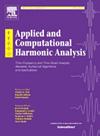随机傅里叶特征的anova增强
IF 3.2
2区 数学
Q1 MATHEMATICS, APPLIED
引用次数: 0
摘要
我们提出了两种算法来增强随机傅立叶特征模型来近似高维函数。这些方法利用经典和广义方差分析(ANOVA)分解来学习低阶函数,其中变量之间的相互作用很少。我们的算法能够可靠地找到重要输入变量和变量交互的索引集。此外,我们将已经存在的随机傅立叶特征模型推广到ANOVA设置,其中可以使用不同顺序的项。我们的算法具有可解释性的优势,这意味着每个输入变量的影响在学习模型中是已知的,即使对于依赖的输入变量也是如此。我们提供了理论和数值结果,表明我们的算法在灵敏度分析中表现良好。anova增强步骤显著降低了现有方法的近似误差。本文章由计算机程序翻译,如有差异,请以英文原文为准。
ANOVA-boosting for random Fourier features
We propose two algorithms for boosting random Fourier feature models for approximating high-dimensional functions. These methods utilize the classical and generalized analysis of variance (ANOVA) decomposition to learn low-order functions, where there are few interactions between the variables. Our algorithms are able to find an index set of important input variables and variable interactions reliably.
Furthermore, we generalize already existing random Fourier feature models to an ANOVA setting, where terms of different order can be used. Our algorithms have the advantage of being interpretable, meaning that the influence of every input variable is known in the learned model, even for dependent input variables. We provide theoretical as well as numerical results that our algorithms perform well for sensitivity analysis. The ANOVA-boosting step reduces the approximation error of existing methods significantly.
求助全文
通过发布文献求助,成功后即可免费获取论文全文。
去求助
来源期刊

Applied and Computational Harmonic Analysis
物理-物理:数学物理
CiteScore
5.40
自引率
4.00%
发文量
67
审稿时长
22.9 weeks
期刊介绍:
Applied and Computational Harmonic Analysis (ACHA) is an interdisciplinary journal that publishes high-quality papers in all areas of mathematical sciences related to the applied and computational aspects of harmonic analysis, with special emphasis on innovative theoretical development, methods, and algorithms, for information processing, manipulation, understanding, and so forth. The objectives of the journal are to chronicle the important publications in the rapidly growing field of data representation and analysis, to stimulate research in relevant interdisciplinary areas, and to provide a common link among mathematical, physical, and life scientists, as well as engineers.
 求助内容:
求助内容: 应助结果提醒方式:
应助结果提醒方式:


